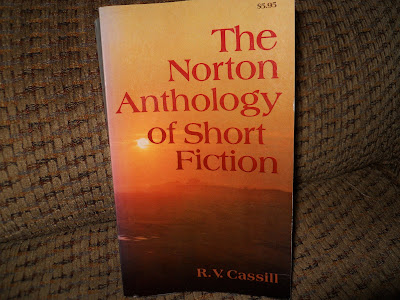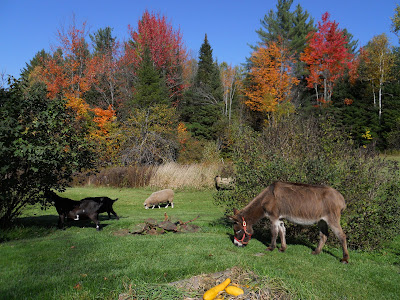
To learn more about this yearlong adventure with Gladys Taber and Rachel Peden, you may scroll down to 'letter topics' and click A Year with Gladys and Rachel.
As I sat down to read the October entries of Gladys Taber and Rachel Peden, I had just eaten Gladys' recipe for French toast, the easiest and most delicious ever!
Cut the crusts off two pieces of bread.
Whisk together an egg and 1/4 (she used 1/3) cup milk.
I then pour the mixture into a 7x11 glass pan, and dip the bread until it has completely absorbed the liquid.
Warm the maple syrup.
Heat up the griddle to 350º and spray with cooking spray.
Cook the bread on both sides. Serve with butter and the maple syrup.
Here is what the outdoors looks like at Windy Poplars Farm on this Sunday afternoon. Last night we had a lovely, gentle, soft snowfall, and the snow is staying unlike the other day when it had all melted by noon.

It seemed strange to see this while reading Gladys' words about the colors of October, but it just shows how very much the landscape changes during what she calls the 'dramatic' month. We begin October with those colors which people from all over the world come to see. As Gladys says, 'everyone knows about autumn in New England.' After the leaves fall off, we have a ground full of color instead. Then they turn brown and blow around. I'm not one for raking. Invariably when I go out to rake, the wind kicks up and my leaf piles quickly blow away. I've learned over the years to just let the leaves stay. They very often settle in the flower gardens providing soil-improving mulch and some protection against the winter cold. It's interesting to me that Gladys didn't mention raking this month. Maybe she also let the leaves be.
Gladys says,
Now is the time to go out to the woods for butternuts and hickory nuts and hazelnuts. ... We carry old gunnysacks and we fill them. ... Staggering under the weight of the sacks, we finally come home, feeling we have done a very worthwhile thing. Never mind that we never do get all the nuts shelled. We crack some with the flatiron on the hearthstone, but we never really get to them all. I surmise it is more fun to adventure in the autumn woods than to dig out the tiny meats afterward with a pick.I have read in old books about 'going nutting.' But I've never known anyone who did so. When I was a girl, older women would talk about 'going berrying' but as far as I can remember no one ever gathered nuts. I don't even know if there are nut trees in the surrounding woods. I've never heard of any.
As she writes of hanging the blankets on the line for their annual freshening, she is reminded that 'all our blankets have stories about them.' Two that belonged to her grandmother get her thinking about that grandmother's son, Gladys' Uncle Walter, and a walk she took with him after her own mother died.
The street lamps cast a pale lemon glow on his erect figure, his careful hat, his impeccable shoes. All he said was so simple and so short. We walked, and the light fell on him, and the shadows moved. The new-cut grass on the lawns smelled sweet. A little dog nosed along the curb and vanished.It feels to me that we have traveled light years from this philosophy, to a time when everyone tells everything to anybody. I guess we have learned that it is good and helpful to talk our problems over with someone, but I think we have gone way too far in the opposite direction from the words of Uncle Walter.
"The Raybolds [Gladys' maternal family name] have always been heavy burden-bearers," he said quietly and as if that were to be expected and accounted for.
At that moment I felt myself one of a dim line stretching back and back and back, of people who went about their business and just bore their burdens. He never said another word to me about mine, he just let me assume I was to bear mine in the family tradition.
It is strange how that simple statement has sustained me down the years. Thereafter, every time I felt crushed by events, I stiffened my spine, and said softly, "well, we Raybolds have always been heavy burden-bearers."
I will close this month's letter about Gladys' October chapter with her stirring words:
There is always one moment in a day when I think my heart will break. Such a moment I think all women have, and men too, when all the meaning of life seems distilled and caught up and you feel you can never, never bear to leave it. ... My definition of happiness is just the ability to garner the perfect moments.And aren't we, her readers, lucky, lucky that she shared them with us.
I suspect that some of us smug New Englanders think we are the only place on earth where the real autumn may be found. Oh, we know that trees turn color in other places, but the show can't be like ours. But if we read Rachel Peden wax poetic about the colors in Indiana, I think we must let our feelings of superiority slip a bit.
Indiana's autumn leaf coloring, like the Grand Canyon, is so magnificent and spectacular that the only way you can describe it, or even believe it, is to understate it.I am duly humbled!
Let it be said, therefore, that in a hillside around which Maple Grove Road climbs on its way to town, there is a young beech tree that has authority to speak for all beech trees. Its coloring bronzy-yellow leaves shine with a metallic glitter. Enough of them have dropped to make the ground glitter also, around the tree, and yet the tree is not diminished of its glory. Anyone who has seen it will remember its light all winter.
Throw in sweet gum and ash for purple; sassafras for sentimental pink and deeper red; sumac for a glossy bright red; luminous yellow for poplar and papaw and hickory and maple. Add the kaleidoscopic pink, yellow, rose, and red of maples; the quiet, mighty old-hymn brown of oak; the warm, live brown of tall white sycamore; the dark, melodious red of wild blackberry's rough leaves; ... In autumn not an acre, hardly a foot of rural Indiana is lacking in splendor. It is gaudy, breath-taking, unbelievable - it is Indiana in autumn dress.
One of the minor plagues of my life is the fruit fly. Not for me those adorable wire baskets you see in the magazines, filled with lovely lemons and limes. You won't find a beautiful fruit bowl on my kitchen table. I even break the storage rule and keep my tomatoes in the refrigerator. Why? All because of the dreaded fruit fly. So, I was greatly consoled by reading that Rachel was dealing with them in her own kitchen fifty years ago. She knows it as a vinegar gnat.
It is doubtful that any insect has solved the complexities of personal nourishment and storage better than the vinegar gnat has.She goes on to talk about the use of fruit flies in the study of genetics, and ends her passage with,
If you need some for research on this point, you need only lay a bitten apple on the kitchen table, or a few grapes pulled from their stems, or a tomato weeping over its wasted life. Vinegar gnats will suddenly be there. From where, goodness knows. They arrive quietly, requiring no more space than the wind requires. Their sense of news must be prodigious.
... Gnats never seem to fly very fast, but they fly elusively, as every housekeeper knows who has tried to clap her hands together into a gnat sandwich.
Decidedly, with such an outstanding scientific career possible, the vinegar gnat is wasting its time in the farm kitchen.The Peden family also goes nutting and afterward,
Carol picked out the black nuts whose hulls cattle had trodden off, and Joe spread them out on the brooder-house roof, where rain would wash them and sun would dry them. I poured the unhulled ones into the driveway; there incoming tires would mash off the hulls.Speaking of rain, this year that Rachel was writing there was a very dry three weeks. And I learned the most amazing thing. Her husband came in to tell her that the
"spring had started running again. So now I know it's going to rain soon. I don't know why it is, but after there's been a long dry spell, the creeks and springs start flowing again just ahead of the rain."She writes of taking the dog, Rose for a walk. 'In the woods there is much for a dog to read, and Rose reads well.' As we walk each day with Sadie, one or the other of us remarks on what she learns about the world. She stops and her nose wiggles as she stares into the trees. She pauses every few yards to smell whose feet have walked this path before her. We humans are sorely lacking in this department.
He was right. Monday evening the long-yearned-for rain began. ... It was perfect weather: it was raining.
I shall close the October chapter with a deeply felt passage from Rachel.
For some people autumn is summed up in the magnificent drama of colored leaf. For me, the most poignant, almost unbearably dramatic, thing about it is the passage of wild geese, southbound in a chilly autumn evening, over the farm. There was one time in particular when the children were little ...Rachel's writing is full of such truths.
They came swiftly, a long, dark line undulating against the blue evening sky, like a dark ribbon tossed into water.
They were high above us, flying diagonally across the clover field. We could see the leaders at the head of the inverted V, and we could hear the weariness in the lonely, beautiful, wild crying. We watched until they had disappeared entirely, and it was as if some part of us had gone with them.
As we turned back to the wagon in the darkening evening, I was aware that some important truth had been summed up in the flight of the dark, vanished birds. It was stated in the cold, clean fragrant air, in the crackling of dry leaves under our feet, and in the blended colors of far-off hills, where already many emptied trees were only bare, dark outlines. It was a statement of acceptance, but not of resignation. ...
There was something there that was immensely lonely and vulnerable, and yet invincible; ... this poignancy in which transience and permanence exist side by side, in the same thing.


















































